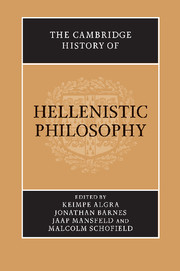Book contents
- Frontmatter
- PART I INTRODUCTION
- PART II LOGIC AND LANGUAGE
- PART III EPISTEMOLOGY
- PART IV PHYSICS AND METAPHYSICS
- PART V ETHICS AND POLITICS
- 19 The Socratic legacy
- 20 Epicurean ethics
- 21 Stoic ethics
- 22 Social and political thought
- Epilogue
- Synopsis of principal events
- Editions of sources and fragments
- List of abbreviations
- Bibliography
- Index locorum
- General Index
- References
Epilogue
from PART V - ETHICS AND POLITICS
Published online by Cambridge University Press: 28 March 2008
- Frontmatter
- PART I INTRODUCTION
- PART II LOGIC AND LANGUAGE
- PART III EPISTEMOLOGY
- PART IV PHYSICS AND METAPHYSICS
- PART V ETHICS AND POLITICS
- 19 The Socratic legacy
- 20 Epicurean ethics
- 21 Stoic ethics
- 22 Social and political thought
- Epilogue
- Synopsis of principal events
- Editions of sources and fragments
- List of abbreviations
- Bibliography
- Index locorum
- General Index
- References
Summary
The schools which dominated the philosophy of the Hellenistic age did not disintegrate or disappear with the end of the Hellenistic era, but for the most part continued to exist well into Imperial times. This certainly is true of the two schools which came into existence only at the beginning of the Hellenistic period, and which in their very origin have a distinctive Hellenistic character, the Stoa and Epicurus’ Garden. We can produce a long list of distinguished Stoic philosophers stretching well into the third century AD: a list that includes Seneca, Epictetus, and Marcus Aurelius. The Epicureans are less conspicuous in Imperial times, but, again, the list is fairly long, including e.g. Diogenes of Oenoanda in the second century AD. The generalization is also true of the two older schools. Indeed the Peripatos, which had lost some of its prominence and influence in Hellenistic times, saw a revival in the Empire, largely by returning to Aristotle, but without entirely shedding the Hellenistic heritage.
More complicated is the case of Plato's Academy. The debate in philosophy in Hellenistic times was crucially shaped by the fact that the Academy under Arcesilaus turned sceptical, and by the dominance of scepticism in the school until the time of Philo of Larissa and Antiochus early in the first century BC, when Platonism re-emerged. So here there was a break of continuity at the end of the Hellenistic era. But it was not a complete break. There continued to be philosophers, like Favorinus of Arelate, who saw themselves as in the tradition of Arcesilaus and Carneades.
- Type
- Chapter
- Information
- The Cambridge History of Hellenistic Philosophy , pp. 771 - 797Publisher: Cambridge University PressPrint publication year: 1999
References
- 23
- Cited by



